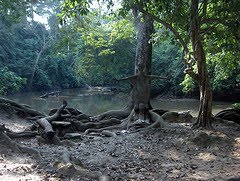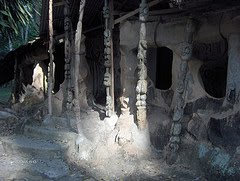Egg-Larva-Pupa- Woman: A Debut Literary Novel
By – Ogọ Akubue-Ogbata
This is an inspirational, albeit heart-wrenching story, of two remarkable personalities who vivaciously defy all odds: Nkiru: a privileged young girl who is forced to learn the art of survival after the tragic loss of her family and innocence as she knows it…Nigeria: Africa’s most populous and controversial country – starting from its pre-infancy days to its present state of flux. Do they have what it takes to defy all odds?
The story kicks off in the early 1950s when two orphan sisters are separated against their wish because their aunt cannot afford to feed two mouths. Nonso is weak and wilts but Nkiru digs deep and keeps on walking. In the wake of her country’s independence from British rule, she meets an aspiring diplomat with radical political views and hopes that love will put her life back on course. However, love only complicates things. Her new husband asks for more than she knows how to give and the past is filled with shameful secrets that threaten to erupt. The plot thickens as Nkiru climbs the ladder of life, fearing the sudden loss of all that she has toiled for (her children’s love, her husband’s trust and the successful business she built out of nothing) all because of a single fatal mistake. At the same time, Nigeria descends further into conflict and corruption as a single foundational flaw leads to a brutal war and lingering mistrust. Eventually Nkiru finds the courage to confront the past and seek forgiveness for an unpardonable sin. This is the only path to peace – both for Nkiru and her beloved country, Nigeria…Set in the politically charged colonial and post-independence Nigeria (as well as the vibrant capitals of Uganda, Sierra Leone and Britain), Egg-Larva-Pupa-Woman is a novel that fearlessly chronicles the history of Africa’s most populous and complex country whilst tackling big themes such as ethnic identity, racial discrimination, domestic violence, gender equality, endemic corruption, entrepreneurship and self actualisation, as well as universal themes such as love, mother-daughter relationships, betrayal and forgiveness. Through a language of passion, poetry and deceptive simplicity, we see sisters and daughters, mothers and wives who metamorphose over time, juxtaposed with a nation’s fight for freedom, fall from grace and pursuit of an elusive destiny.
It takes a measure of mischief to graft the stages of growth of an insect to that of a woman in a debut novel. Ogo Akubue-Ogbata dares to walk where angels fear to tread, as her debut poetry collection bears the audacious title: The Last African Poet. In Egg-Larva-Pupa-Woman Ogo Akubue-Ogbata creates a heroine, Nkiru, whose history blends seamlessly into the history of the Nigerian nation and by extension to the black world; whence the celebration of the novel in the Black History Month. Part One of the novel entitled "Shackles" situates Nkiru's story "Early on 1950s". Part Two entitled "Freedom" extends the story to "1955-1965" while Part Three "The Scattering" dates between "1967-1999". The author's language is poetic from the very beginning: "Nkiru wasn't sure if it was the screaming that woke her or Uyi's glance which poked her on the cheek chicken's beak. Her bed felt slightly damp as she stirred, her pillow cool against her cheek, wet with patches of odourless mouth dribble. For a moment, when she opened her eyes, everything seemed hazy, lazy... Then all of a sudden the images rushed to her face like shreds of metal streaming to a giant horseshoe magnet: walls the colour of vanilla ice-cream, smooth but for a long, thin, crack the shape of a lightning bolt - translucent button-eyed geckos stuck on the top right hand corner like bland stamps on an envelope. Faded Ribena stains on toffee coloured wool-twist carpet, strings of ants curling round slivers of sugar-coated biscuit and an unlit bulb hanging from a distant ceiling - motionless - like a corpse drooping from a noose."
Born into a privileged home, Nkiru and her sister Nonso were inseparable, sleeping on the same bed in a house that boasted of eight good bedrooms. "Are you lesbians?" was the irate question for the duo. Tragedy strikes when Nkiru's father dies, but she shoulders on until she falls in love and marries the radical nationalist, Ejimonye Ndulue, who counts Nigeria's first president Nnamdi Azikiwe as his mentor: "That was how every political discussion ended - with the assignment of one impossible task or another to Zik. After all Nnamdi Azikiwe was more than a politician, more than a god, more than a party leader, more than a bard. They said that before 1934 when he entered the limelight, no other Igbo person had a say in anything, impacted African affairs in any shape or form. It was Zik who sailed to faraway America and returned with Ivy League degrees, Zik who founded the West African Pilot and filled its pages with nationalist editorials, Zik who, with the great Herbert Macaulay, founded the National Council of Nigeria and the Cameroons in 1944, Zik who became NCNC president when Macaulay died two years later, who turned the Igbos, erstwhile farmhands, into intellectual equals. It was his name that children wove into their songs and mothers spiced their lullabies with. So dazzling was the light around this man that for a moment Frank and Ojugo danced together in the ambience, like moths around a hunters lamp."
Ejimonye gets drafted into Foreign Service but his life is not all politics as he tells his new bride Nkiru: "Forget Italians. Arochukwu men are the most romantic lovers in the whole world." Nkiru has her own political heroine in Margaret Ekpo: "Without further hesitation, Nkiru bent over the desk and began to write about her heroine Margaret Ekpo: Margaret who galvanised market women to declare a day of national mourning when the white men shot the colliery workers who demanded a pay rise, drawing worldwide attention to the brutal killings. Margaret who was arrested - alongside Barrister Jaja Nwachukwu and two others - even threatened with deportation from the country of her birth just because a fiery speech of hers had offended a couple of colonial housewives. Nkiru narrated how the Aba market women threatened to set the town ablaze if the colonialists dared lay a finger on their beloved committee president. Surprisingly, the authorities were rattled by the threats and promptly set the foursome free."
Nkiru's hubby Ejimonye is posted to Uganda, and the couple lived there during the Nigeria-Biafra war. The uncertainties of the period dominate the discussion of husband and wife: "Has it ever occurred to you that maybe, just maybe, Nigeria may not survive?" Nkiru said. "I mean, one day a two-week census is being announced and the next day it's cancelled. One minute Governor Akintola is dismissed, the next minute the Supreme Court reverses the dismissal and Akintola returns as Western Region premiere. Following the Western crisis a state of emergency lasted five whole months last year - five whole months! In September Obafemi Awolowo was placed under house arrest, in October Balewa announces a conspiracy and twelve traitors were arrested. Then Awolowo is charged with treason, his court trial triggering violent riots." Nkiru paused for breath, "I'm not saying this country, as we know it, will not survive, or that I don't want it to survive for that matter, but sometimes I wonder how viable this entity called Nigeria really is."
The fiery Ejimonye forcefully posits his optimism thus: "Artificial unions are not unique to Africa - they exist also in Asia, Europe, Latin America and other regions of the world. The English and the Scottish can't stand each other and yet they cohabit with civility. Look at us! We have our own differences in this marriage, don't we?" Egg-Larva-Pupa-Woman is a novel of secrets. Nkiru is savagely raped by Uncle Frank. Nkiru is led on by Dubem to hide a new-born baby in a refuge bin where she would eventually be found by a missionary couple. Naomi who becomes a mirror image of Nkiru cheats on her husband Chuma and confesses only for the man to ask for divorce. Ogo Akubue-Ogbata tells a very human story in Egg-Larva-Pupa-Woman. Her voice is assured. A writer of great promise, she has added the needed dimension to Nigerian independence and the marking of the Black History Month.










Nigerian are good people
ReplyDeleteEgg-Larva-Pupa-Woman is an excellent novel that tells the history of Nigeria from 1950 to 1999! A must read.
ReplyDeletewhat is archaeology in 21st century all abuot
ReplyDelete